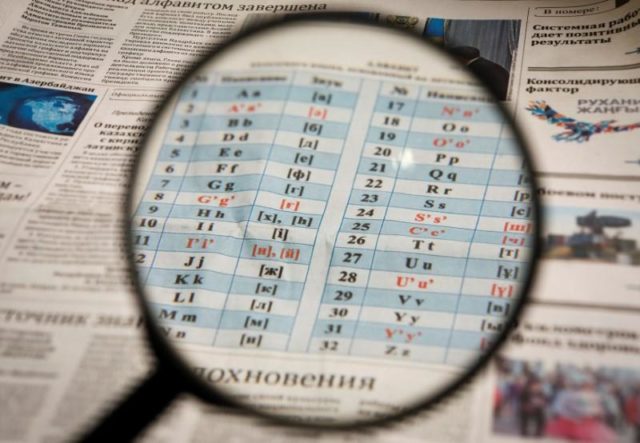
With New Alphabet, Kazakhstan Moves Decisively Away From Russian World
By:

After much debate, Kazakhstani President Nursultan Nazarbayev has approved a new Latin-based alphabet for the titular language of his country. The new alphabet will not include apostrophes as did the Latin script he approved earlier. The adoption of the new alphabet will have three significant consequences. First, it represents a decisive move away from the “Russian World” (Russkiy Mir), which Moscow increasingly defines in terms of language and alphabet. Second, it deepens the divide between the Kazakh majority and the Russian-speaking minority in Kazakhstan, prompting talk of Moscow-supported secession in the northern portions of the country, where most Russians live. And third, and likely most important, it opens the way to closer ties not only with Turkey but with other Turkic nations in Central Asia, the South Caucasus and even within the borders of the Russian Federation (Turan Today, February 20; Ratel, Central Asia Monitor, February 27).
First off, changing the alphabet represents a direct challenge to Moscow, which has chosen to define the Russian World in linguistic and alphabetical terms. Russia has fought all efforts in the post-Soviet space to reduce the amount of Russian used and to block any change in alphabets from the Cyrillic-based ones it imposed on many Turkic and Uralo-Altaic peoples in the 1930s and 1940s. This linguistic restriction hampers these countries from looking beyond the borders of the post-Soviet space. Moscow’s obsession with the Cyrillic alphabet is a new fixation—though it is already a firmly held one (Nezavisimaya Gazeta February 22). With Kazakhstan’s departure from the fold, something that will take several years to achieve, only Kyrgyzstan will still be using what Moscow calls “the Russian alphabet” (see EDM, October 12, 2017)
Second, this script change deepens the divide between Kazakhs and Russian speakers inside Kazakhstan; infuriating some of the latter and pushing a portion of them to leave and others to talk about secession. Such a forced separation is unlikely: Nazarbayev maintains tight control, and Russians in Kazakhstan are doing better than their kin in Russia. Nevertheless, this type of rhetoric will be a source of tension. There will also be tensions within the Kazakh nation itself. Many ethnic Kazakhs speak Russian as their first language and will find it difficult to shift to Kazakh, as Nazarbayev is also demanding, especially if they have to change alphabets as well. It is perhaps significant that Nazarbayev’s own daughter has come out with a statement in support of Russian that implicitly rejects these changes (Politikus, March 1, 2018).
Lastly, this move will give Kazakhstan the opportunity to expand its ties with other Turkic peoples. The new Latin script will unite them, a marked contrast with the Moscow-imposed Cyrillic, which sought to divide them by playing up the dialects within each that is most unlike those in others. That may lead some to begin to talk about a new era of Pan-Turkic movements. At the very least, it will mean that the Turkic peoples of Central Asia—Kazakhs, Kyrgyz, Turkmens and Uzbeks—are likely to feel their kinship more deeply. This, again, is something Moscow will be anything but happy about.



